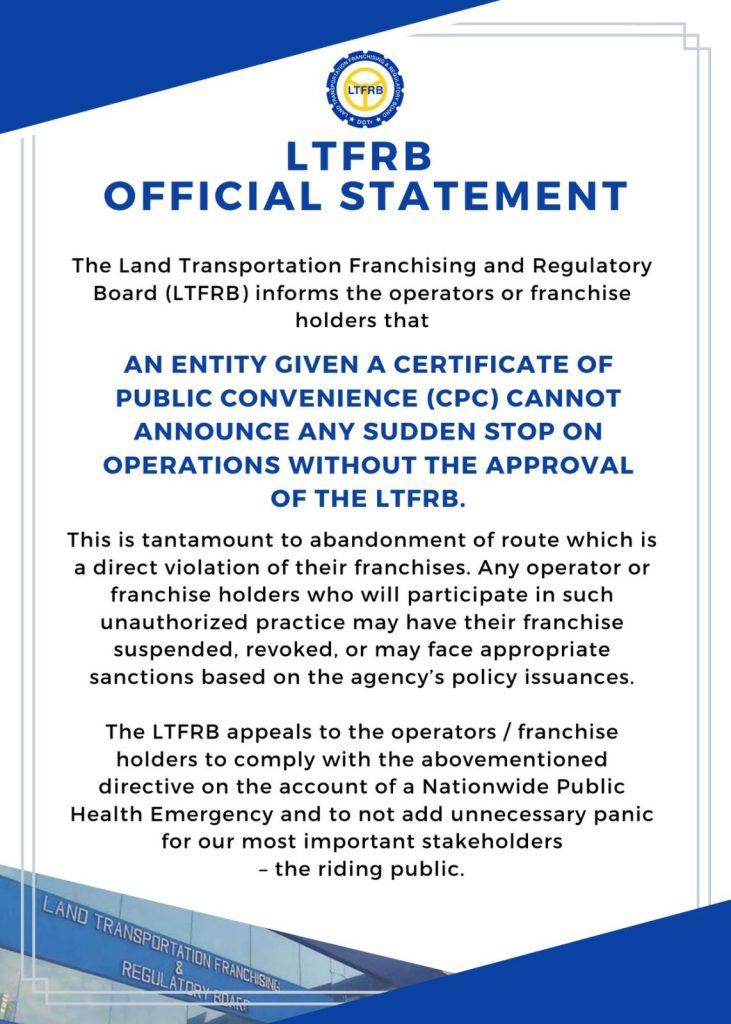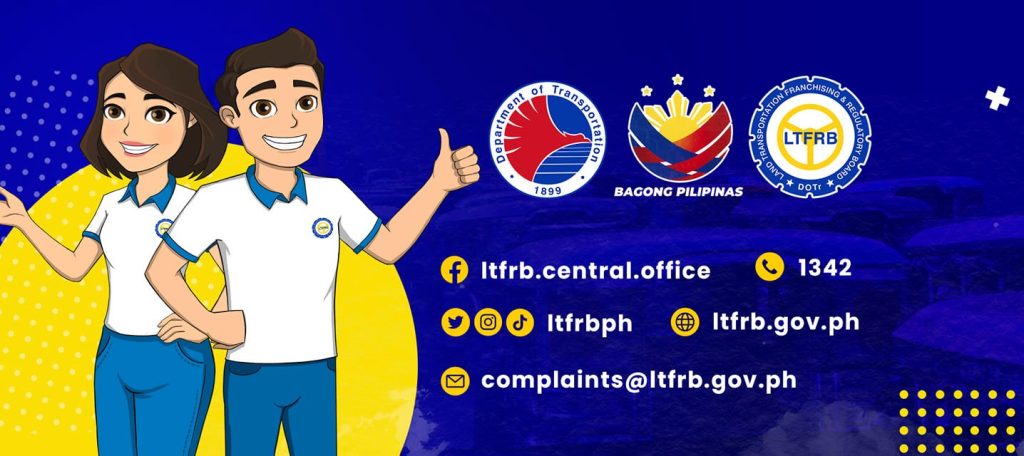A Certificate of Public Convenience (CPC) is an important document issued by the Land Transportation Franchising and Regulatory Board (LTFRB) to operators. It serves as an authorization and a legal permit to offer public services, ensuring compliance with laws and regulations while upholding public interest. In the land transport sector, the CPC serves as an authorization to operate and offer land transportation services to the public as required by law.
Having a CPC means that a public land transport operator is running his business in compliance with the rules and regulations of the land transport sector. It proves that the operator has gone through strict screening and is capable of upholding public safety standards that protect the interests of both passengers and the operators themselves. Without a CPC, operators risk facing legal penalties for operating in violation of regulations and for compromising the quality and safety of transportation services provided to the public. That said, if you are an operator or are looking to become one, this guide will help you understand the necessity of the CPC as well as the requirements and procedures for obtaining one from the LTFRB.
What is a CPC
A Certificate of Public Convenience (CPC) is an official authorization issued by the LTFRB, granting individuals or entities like cooperatives and corporations the legal right to operate land transportation services for public use. Unlike franchises, which may require municipal or legislative approval, a CPC serves as a comprehensive permit for common carriers. While it doesn’t confer proprietary rights over a specific route, it ensures compliance with regulations and standards set forth by the government.

A CPC also serves as a legal permit that allows such person or entity to operate public utility vehicle/s (PUVs) such as Public Utility Bus, Public Utility Jeepney, Utility Vehicle Express, Taxi, Premium Point-to-Point, Tourist Transport Service, School Transport, Shuttle Service, and Truck For Hire, as well as a Transportation Network Vehicle Service (TNVS).
Why is a CPC Important
There are many reasons why it is necessary for individuals or entities to secure a CPC. Some of them are as follows:
- To ensure compliance with legal requirements for operating land transportation services.
- To uphold public safety and interest by regulating the quality of service provided.
- To establish accountability and responsibility for operators in meeting service standards.
- To prevent unauthorized operators from entering the market and creating unfair competition.
- To provide legal protection for operators against infringement on their rights by unauthorized competitors.
- It ensures that vehicles to be utilized for public convenience are roadworthy and properly maintained to enable the public utility operator to provide safe, reliable, comfortable and efficient service.
- It holds the public utility operator accountable, mandating them to take responsibility in case they fail to provide and maintain safe, reliable and efficient service.
When is a CPC unnecessary
While a CPC is necessary for most land transportation services, there are exceptions where it may not be required. These include:
- Operations involving warehouses, animal-drawn vehicles, or certain airships.
- Public utilities operated directly by the national government or political subdivisions, excluding rate regulation.
- Radio companies, ice plants, and public markets may not require a CPC, depending on specific circumstances and regulations.
Who Can Get a CPC
While any person who intends to secure a new CPC or operate a TNVS may apply for the issuance of one, it is still subject to specific qualifications and requirements by the LTFRB. The requisites for its issuance include:
- Citizenship: Applicants must be Filipino citizens, or corporations with at least 60% Filipino ownership.
- Financial Capability: Demonstrated ability to undertake proposed services and meet operational responsibilities.
- Promotion of Public Interest: Evidence that the proposed service will benefit the public in a suitable manner.
Requirements
To apply for a CPC, applicants must present certain documentary requirements, including:
- Application alleging proof of citizenship, financial capacity with annexes and indicating therein the email address and contact number of Applicant and verification and certification against Non-Forum Shopping (4 Original Copies)
Note: The Petition/Application must be notarized
- Attestation (as to the authenticity and truthfulness of the documents submitted)
- Orange Folder
- LTO OR/CR of unit/s sought to be authorized with year model
- If unit is encumbered: Certificate of Conformity
- If unit is leased: Affidavit of Undertaking Pursuant to MC 2018-015
- If unit is imported or rebuilt: Certificate of Year Model (JAO 2014-02)
- Except for Partnership, Corporation, Cooperative and individual PUJ operator: Certificate of Business Name
- If with at least ten (10) units: Undertaking to Comply the Tree Planting requirement pursuant MC 2020-076, in relation to BR No. 021, series of 2021
- Proof of Filipino Citizenship
- For Individual Applicant: Proof of Filipino citizenship (Birth Certificate, Passport, Voter’s ID or any valid Government-issued Identification Card showing citizenship
- For Juridical Entity
- For Corporation
- Articles of Partnership/Incorporation and By-laws
- Certificate of Registration
- For Cooperative
- Articles of Cooperation and By-laws
- Certificate of Registration
- Certificate of Good Standing
- For Corporation
- Proof of Financial Capability
- Stamped received of Latest Income Tax Return or Certificate of Registration with BIR (Transportation as line of business), if newly registered operator
- If PUJ, TX, STS, TC and UV: Proof of Bank Deposit in the amount of PHP 20,000/unit
- If PUB, SHB, TB, and TH: PHP50,000 per unit and
- For operators with more than three (3) units: Audited Financial Statement
- LTFRB Motor Vehicle Inspection Report with Picture of unit during inspection
- For Applications under PUVMP
- Fleet Management System with organized vehicle dispatch procedure (except for Taxi, Truck for Hire, Tourist Transport Service, Shuttle Bus, School Transport Service)
- Automatic Fare Collection System (AFCS) for Highly Urbanized Cities (HUCs) (except for Truck for Hire, Tourist Transport Service, Shuttle Bus, School Transport Service).
- For Rural Areas: Undertaking to comply with the AFCS
- For PUB Service: OTS Approved Bus Operator Security Plan as per MC No. 2021-035
- For Tourist Transport Service
- Valid Department of Tourism (DOT) and Department of Transportation (DOTr) Endorsement Letters per Department Order No. 2013-004
- Valid Concession Agreement
- For School Transport Service: Valid Parent-Teacher Association or School Certification/Endorsement Letter Authorizing/Accrediting the School Service
- For Truck-for-Hire
- Notarized Hauling Contract with duration of contract, or
- Authority to Operate in Ports, Trade Centers, Economic Zone and the like
- For Shuttle Service: Notarized Shuttle Service Contract with duration, time and the specific pick up and drop off points
- For UV Express Service: Proof/Certificate of Existence of Endpoint Terminals- Origin and Destination Secured from Property Owner of the terminal
- To be submitted during the hearing
- Proof of Publication of Notice of Hearing
- Affidavit of Publication by the publisher
- Clippings of the Newspaper where the Notice was published
- Cover page: Formal Offer of Evidence containing all exhibits duly marked
- Proof of Publication of Notice of Hearing
For Authorized Representatives of Applicant
Personal appearance of the petitioner is required, but if it isn’t possible for a petitioner to be physically present, an authorized representative is allowed upon presentation of:
- For Individual Operators
- Duly notarized Special Power of Attorney (SPA)
- Valid Government-Issued ID of the applicant and authorized representative
For Cooperatives
- Board Resolution authorizing the filing of application for New CPC and delegating the authorized representative/s to file and to appear during the Hearing.
- Valid Government-Issued ID of the authorized representative
For Corporations
- Board Resolution/Secretary’s Certificate authorizing the filing of application for New CPC and delegating the authorized representative/s to file and to appear during the Hearing
- Valid Government-Issued ID of the authorized representative
Procedures
The process of obtaining a CPC involves several steps, including:
Step 1. Visit the LTFRB Central Office or Regional Franchising Regulatory Board (RFRO).
Step 2. Secure the Petition/Application form and checklist of requirements at the LTFRB Public Assistance Complaint Desk (PACD).
Step 3. Proceed to the pre-evaluation and wait for the Admin Aide of PACD to finish checking your documents for completeness
Step 4. Submit the Verified Application/Petition form and the required documents for evaluation at Windows 8 and 9 and wait while the assessment of fees is completed.
Step 5. Claim the Payment Order Slip (POS).
Step 6. Proceeds to Cashier (Door B) for payment.
Step 7. Wait for the cashier to issue your Official Receipt.
Step 8. Submits the Petition/Application form along with the Official Receipt of Payment at Window 8 and 9.
Step 9. Proceed to Window 11 and wait for the claim stub which bears the date when to claim a copy of the application/ petition order.
Step 10. Wait for the Notice of Hearing to be sent via email.
Step 11. Attend the scheduled hearing and submit the Formal Offer of Evidence (FOE) before the Hearing Officer.
Step 12. Claim the Decision/Order at the Information Systems Management Division (ISMD) Releasing Unit on the 2nd Floor (LTFRB Central).
Validity Period of the CPC
A CPC is typically valid for a period of five years from the date of issuance. Operators must renew their CPC before expiration to continue operating legally.
Fees
Various fees apply throughout the CPC application process, including filing fees, unit verification fees, and inspection fees. These fees may vary depending on the number of units and specific circumstances of the application. At the very least, you must be prepared to pay the following:
- Filing Fee: For the 1st 2 units: PHP 510.00
- Succeeding units: PHP 70.00/unit
- Legal Research Fee: PHP 10.00
- Inspection Fee
- PHP 50.00 for PUV (with gross weight not exceeding 4,500 kg) per unit
- PHP 100.00 – for bus and truck per unit
We hope that with this guide, you can come prepared when you visit the LTFRB Office for the application for the issuance of your new CPC. For more information, you may check out the official LTFRB website or reach out to them via the following:
